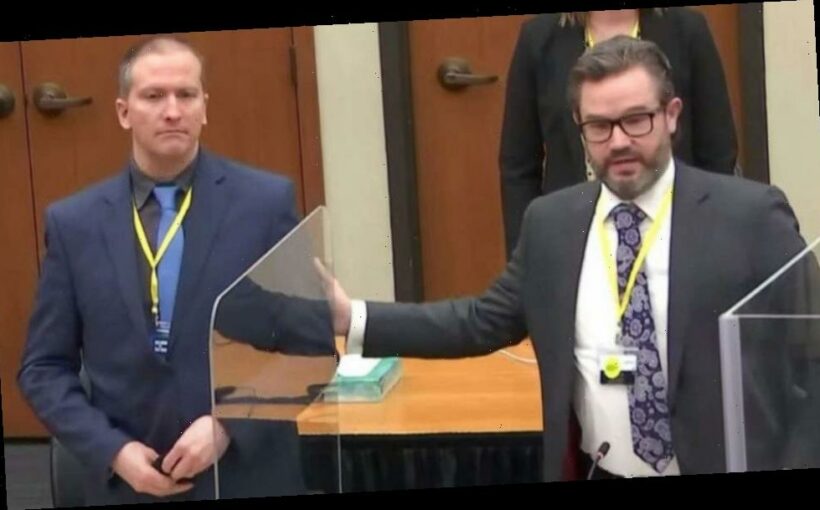The trial of former police officer Derek Chauvin was dealt a major setback on Wednesday when the judge in the case dismissed two jurors already selected for the panel after they said they heard about the $27 million settlement the city of Minneapolis reached with the family of George Floyd and conceded they can no longer be impartial.
Hennepin County District Court Judge Peter Cahill removed the two jurors from the panel following Zoom hearings held in court with each of the nine members that had been picked to hear evidence in the trial.
Two other jurors said they had inadvertently heard of the settlement announced on Friday, but felt they could set aside what they heard or saw about the civil court action and maintain impartiality and decide the case based solely on the evidence presented during the trial.
But the two jurors Cahill excused from the panel said the dollar amount the city agreed to give the Floyd family confirmed the reservations they already had about Chauvin’s culpability in the death of Floyd during a May 25, 2020 arrest, in which the former police officer was videotaped by a bystander kneeling on the back of the 46-year-old man’s neck for more than nine minutes as he cried out “I can’t breathe.”
Asked by Cahill how knowledge of the settlement would affect his ability to be impartial in this case, one of the dismissed jurors, a Hispanic man, who had been referred to in court as Juror 36, said, “It will impact it a lot.”
He reminded Cahill that he had been questioned extensively about “my strong opinions” against Chauvin.
“Clearly the city of Minneapolis has some strong opinions as well and this just kind of confirms the opinions that I already have,” he said. “I think it will be hard to be impartial.”
The second dismissed juror, a white man known as Juror 36, described the $27 million settlement as “kinda shocking.”
“That kinda sent the message the city of Minneapolis felt something was wrong and they wanted to make it right to the tune of that dollar amount,” he said before being removed from the case.
The impaneled jury now drops to seven members from the nine that had been selected since jury selection began on March 9.
The judge and lawyers in the case said they want to seat 14 jurors for the trial, including two alternates.
Chauvin is charged with second-degree unintentional murder and second-degree manslaughter. A third-degree murder charge was reinstated last week after the Minnesota State Court of Appeals ruled that Cahill had errored by dismissing the count in October.
Chauvin has pleaded not guilty to the charges.
Chauvin’s attorney, Eric Nelson, asked Cahill on Monday to poll all the selected jurors to determine if news of the settlement influenced their ability to judge the case on the facts.
Nelson requested a continuance of the trial and for the court to consider again a change of venue based on what he described as “prejudicial pre-trial publicity.”
Cahill said Wednesday that he will hold a hearing on Nelson’s motions on Friday. He denied Nelson’s motion to sequester the jury for the duration of the trial, which is expected to last at least four weeks.
Nelson said on Monday that it was “perplexing to me” that the settlement announcement came right in the middle of jury selection.
“They had a press conference on Friday where the mayor of Minneapolis is onstage with the City Council and they’re using, what I would say, very well-designed terminology. The ‘unanimous decision of the City Council’ for example. It just goes straight to the heart of the dangers of pre-trial publicity in this case,” Nelson argued. “You have elected officials — the governor, the mayor — making incredibly prejudicial statements about my client.”
Cahill responded that “the defense has a legitimate concern.”
Cahill said the settlement announcement “has to be characterized as prejudicial pre-trial publicly.”
Prosecutor Steve Schleicher of the Minnesota State Attorney General’s Office assured Cahill that his team had nothing to do with the announcement.
“We can control the witnesses that we call, we can control the evidence that we bring in, we can control the motions, but we cannot and do not control the civil aspect of the case. We cannot and do not control the Minneapolis City Council and we certainly cannot and do not control the news cycle,” Schleicher told Cahill on Monday.
Since the announcement of the settlement, several prospective jurors have been dismissed after informing the court they had heard of the settlement.
One would-be juror released from jury service this week — a woman who works in human resources — said during voir dire questioning, that while she understands a civil case decision is based on a preponderance of evidence, a verdict in a criminal case is decided beyond a reasonable doubt.
“Generally the preponderance of the evidence in civil cases leans towards guilt,” she told Cahill. “My guess is that with that large of a settlement that the city felt they would not prevail in civil court and therefore didn’t feel that they could make a case to overcome the preponderance of the evidence.”
Source: Read Full Article
